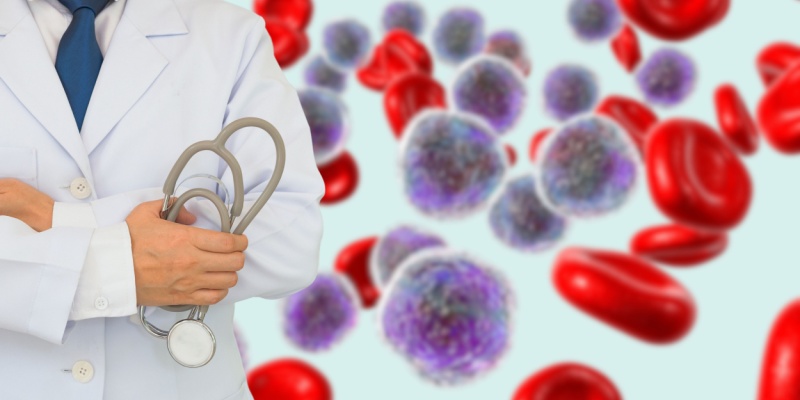
The menin-KMT2A inhibitor JNJ-75276617 showed an acceptable safety profile and encouraging efficacy in patients with relapsed or refractory acute leukemias harboring KMT2A or NPM1 alterations, according to a recent study.
The phase I, multicenter, open-label, dose-finding study was led by Elias Jabbour, MD, of the University of Texas MD Anderson Cancer Center, and presented at the 65th American Society of Hematology Annual Meeting & Exposition.
Fifty-eight patients with either acute myeloid leukemia (AML; n=56) or acute lymphoblastic leukemia (ALL; n=2) received JNJ-75276617. Multiple dose levels of ≥15 mg have been evaluated on either daily or twice daily dosing schedules. Dose escalation is ongoing, with the recommended phase II dose to be determined.
Of the 26 (63%) patients who experienced a reduction in bone marrow (BM) disease burden, 16 (39%) had a ≥50% decrease in BM blasts. The overall response rate (ORR) for the eight patients receiving the highest dose level (90 mg twice daily) was 50%, with seven patients ongoing.
Of those eight patients, three achieved complete remission (CR), one achieved complete remission with partial hematologic recovery (CRh), three achieved complete remission with incomplete hematological recovery (CRi), and one achieved partial remission (PR). The median time to first response (≥PR) was 1.81 months, the time to CR, CRh, or CRi was 1.77 months, and the time to CR was 2.79 months.
The percentage of KMT2A-altered cells decreased from 59.2% at baseline to 8.1% after treatment. NPM1 variant allele frequency also decreased from 13.1% at baseline to 2.8% after treatment.
Thirty (52%) patients experienced one or more treatment-related adverse events (TRAEs), most commonly differentiation syndrome. Seventeen (29%) patients experienced Grade ≥3 TRAEs such as neutropenia, anemia and thrombocytopenia, differentiation syndrome, and increases in ALT and AST. Five patients (9%) experienced dose limiting toxicities.
Reference
Jabbour E, Searle E, Abdul-Hay M, et al. A first-in-human phase 1 study of the menin-KMT2A (MLL1) inhibitor JNJ-75276617 in adult patients with relapsed/refractory acute leukemia harboring KMT2A or NPM1 alterations. Abstract #57. Presented at the 65th ASH Annual Meeting & Exposition; December 9-12, 2023; San Diego, California.






 © 2025 Mashup Media, LLC, a Formedics Property. All Rights Reserved.
© 2025 Mashup Media, LLC, a Formedics Property. All Rights Reserved.